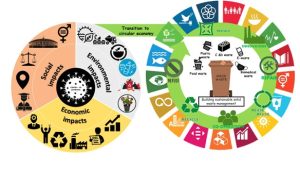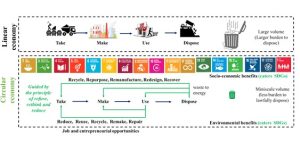Prof. Dr. Hassan Mahmood Mousa Abo Almaali
College of Pharmacy Kerbala University
Introduction:
Sustainability, a term that has gained significant prominence in recent decades, encapsulates a multifaceted concept aimed at maintaining the harmony between environmental, economic, and social dimensions of our world. It is a paradigm that recognizes the delicate interdependence of these dimensions and endeavors to ensure that the needs of the present generation are met without compromising the ability of future generations to fulfill their own needs. Amidst a rapidly changing world, sustainability has emerged as a guiding principle, urging us to tread lightly on the Earth and make conscious choices that promote longevity, resilience, and equilibrium.
Environmental Stewardship:
At its core, sustainability embodies a profound respect for the environment. It acknowledges that our planet’s resources are finite and susceptible to degradation, urging us to be responsible stewards of the natural world. In the ecological dimension of sustainability, practices such as recycling, reforestation, and the protection of endangered species can mitigate the adverse impacts of human activity on ecosystems and safeguard the delicate balance that sustains life on Earth.
Economic Resilience:
Moving on to economic sustainability, this facet is closely intertwined with environmental concerns. An economy that is sustainable ensures the efficient allocation of resources, minimizes waste, and avoids practices that lead to social disparities or environmental degradation. The concept of a circular economy has gained traction, emphasizing the reduction of waste by recycling materials and reusing products. Through sustainable economic growth, societies can transition toward systems that are both prosperous and environmentally responsible.
Social Equity:
Shifting our focus to social sustainability, the aim is to foster equitable societies that cater to the well-being of all individuals. This includes ensuring access to education, healthcare, and basic human rights, irrespective of factors such as gender, race, or socio-economic status. By nurturing a sense of belonging and shared responsibility, these communities create an environment where people can thrive, contribute, and participate meaningfully in shaping their collective future.
Education and Collaboration:
Education and awareness play a vital role in the advancement of sustainability. As the impacts of climate change become more evident and the consequences of unsustainable practices more pronounced, individuals and organizations are recognizing the urgent need to change course. Governments, businesses, and civil society are increasingly collaborating to implement policies and initiatives that promote sustainable development.
Paradigm Shift:
In essence, the journey toward sustainability demands a paradigm shift in thinking and action. It requires us to move beyond short-term gains and embrace a long-term vision that encompasses the well-being of the planet and its inhabitants. This transformation involves adopting innovative technologies that reduce environmental impact, fostering sustainable consumption patterns, and integrating sustainability principles into business strategies.
Agriculture:
Turning our attention to agriculture, a cornerstone of human civilization, it is also undergoing a sustainable revolution. Techniques such as crop rotation, organic farming, and agroforestry promote soil health, reduce the need for harmful pesticides, and conserve water resources.
Fashion:
Sustainability also extends its reach to the world of fashion, where the “fast fashion” model is giving way to more responsible practices. By encouraging consumers to buy less and choose quality over quantity, sustainable fashion strives to minimize its ecological footprint.
Transforming Transportation:
Transportation, a key contributor to greenhouse gas emissions, is undergoing a sustainable transformation as well. Electric vehicles, public transportation systems, and biking infrastructure are reducing the carbon footprint of commuting.
Digital Challenges:
The digital age, while bringing forth numerous benefits, also poses sustainability challenges. Sustainable information and communication technology (ICT) strives to mitigate these impacts through energy-efficient hardware, renewable energy sources, and responsible disposal of electronic waste.
Conclusion:
In conclusion, sustainability acts as a compass guiding us toward a future where the world remains habitable, prosperous, and just. By embracing sustainable practices, we can collectively embark on a transformative journey that safeguards our present and paves the way for a flourishing future.
References:
⦁ United nations, https://www.un.org/en/academic-impact/sustainability
⦁ Sharma HB, Vanapalli KR, Samal B, Cheela VRS, Dubey BK, Bhattacharya J. Circular economy approach in solid waste management system to achieve UN-SDGs: Solutions for post-COVID recovery. Sci Total Environ. 2021, 15;800:149605.
⦁ Alawneh R., Ghazali F.E.M., Ali H., Asif M. Assessing the contribution of water and energy efficiency in green buildings to achieve United Nations sustainable development goals in Jordan. Build. Environ. 2018;146:119–132.
⦁ Cunningham K. New study highlights the rise in e-waste during global pandemic. Recyc. Today. 2020































































